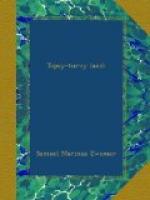[Illustration: THE SULTAN’S SOLDIERS.]
Supposing there was a country where all the people wore their garments wrong side out because they knew no better, and then some one came wearing his clothes properly and trying to teach these ignorant people, would they not think him mad and say why do you not turn your coat inside out?
That is the very way Moslems regard the missionary. They often tell us, “You are so good and kind why don’t you accept the true religion and become a believer?” You must not think that the heathen or the Mohammedans are anxious to hear the gospel. They do not know of its value and so do not know what they miss. When they hear that the gospel demands a holy life and forbids all swearing and lying and uncleanness, they think such a religion too difficult and prefer their own. All their topsy-turvy ways and thoughts seem perfectly correct to themselves until God’s Spirit enlightens them.
It is no wonder therefore that there is always opposition and trouble when missionaries (even such quiet little missionaries as we read about), come to a village. When you want to put a thing straight that is upside down there is sure to be an overturning. The farmer is not sorry because his rude plow breaks the hard soil and bruises the weeds and turns all the greensward under. Oh no; he does that to make some better green grow. Wait three months and you will see the whole field covered with a waving harvest of wheat. Ploughing is pretty rough work on weeds. Opening a new mission station is pretty rough, I admit, on a false religion. And the wise men cannot help knowing this and so they repeat the words of the old Greeks when they see a missionary settle down in their village: “Those that have turned the world upside down are come hither also ... saying that there is another King, Jesus.”
The king of all hearts in the Mohammedan world is their prophet Mohammed. They love his name and imitate his acts to the least particular. Much more faithfully, I fear, than we imitate Jesus, our example. The great question in Arabia is whether Mohammed or Jesus is to rule the country. Mohammed has had it very much his own way for thirteen hundred years, but now his dominion is being disputed. God’s providence is working in many ways to help His gospel. I sometimes think that we might call His providence the plow and His gospel the good seed. For example, what a strange thing it is for the Arabs to find Christian governments interfering with their slave trade. Does not the Koran approve of slave holders and did not Mohammed buy and sell slaves? And then when the big merchant ships come to the coasts of Arabia and the ignorant Arabs learn of other lands and peoples and civilisation they cannot help losing some of their pride and prejudice. They compare the government of England in Aden with that of the Turks in Sanaa and then—well they feel like turning the world upside down themselves!




